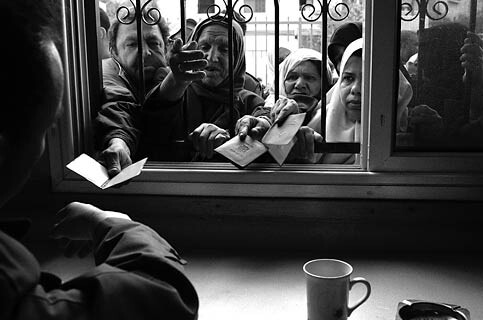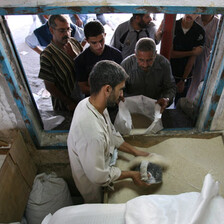Palestine Report 29 April 2005

Food distribution at a UNRWA distribution center in Rafah. UNRWA has declared Rafah an emergency situation. The mass unemployment has meant that people cannot afford to buy products available in the markets, including fresh vegetables. Rafah, Gaza, 2003. (Photo: Asim Rafiqui)
On the second floor of a small three-story house in one of the dark and winding alleys of the Yubna Refugee Camp in Rafah, a man raises his hand.
“What are you going to do about the privatization of the water and electricity utilities,” he asks. His question is greeted with nods of shared concern from the 50-odd assembled men in the L-shaped room. Facing the group of camp residents, and fronting a backdrop of the green colors of Hamas framed by two Palestinian flags, three bearded men briefly confer with their eyes before deciding who will field the question.
“The privatization of utilities is a decision taken by the parliament,” Fawzi Barhoum, the Hamas spokesman in Rafah and one of the municipal candidates on the movement’s Reform and Change list for the May 5 elections, finally says. “Hamas is aware that people are concerned that bills will rise as a result, but on a municipal level there is nothing we can do about it. We have, however, discussed extending municipal allocations to cover bills for the poor, and to cover this we are thinking of asking that instead of paying zakat (Islamic alms) at their mosques, people do so to the municipality. We believe that if people trust that the municipality will spend their money in the interests of the people they will be willing to pay more to the municipality.”
His answer only leads to another question. Rafah municipality is already in debt to the tune of NIS5 million and more than 50 percent of utility bills have remained unpaid in the last four years.
“If the utilities are privatized this debt will only go up,” another man says, turning off his phone which had just at that moment started ringing to the tune Jingle Bells. “How will you persuade anyone to pay their bills?”
Another of the three men answers this question. Jamal Homs is an ear, nose and throat specialist at Khan Yunis’ Nasser Hospital, but as a resident of Rafah is running for local elections there.
“We are under no illusions that it will be easy, and we are not promising overnight change. What we do believe is that the most important first step is for people to trust the municipality. Without that no one can do anything. This means that there will be no appointments based on anything other than merit, and the fight against corruption will take priority.”
The questions are urgent. Rafah has been the hardest hit Palestinian municipality during the Intifada. According to UN figures, since 2000 up until October 2004, 1,497 houses in Rafah and its refugee camps have been demolished. Sewage networks are in tatters and the streetlights that still stand in Yubna remain unlit. Unemployment is rampant and poverty affects 83 percent of the city’s population. With the calm prevailing, people’s thoughts have moved away from survival to work.

A man whose house was destroyed by the Israeli army holds up the certificate given to him by the Red Cross attesting to the destruction. “For Security Reasons”. Rarely has a phrase meant so little, but been used to such a devastating effect. It stiffles argument, represses morality, negates rationality, erases compassion, nulifies common sense, and annihilates thought. Rafah, Gaza, 2003. (Photo: Asim Rafiqui)
In another part of Yubna, Hasan Namle, 51, remembers better days. When he used to work in Israel, he could make as much as NIS6,000 (approx. $1,400) a month in the construction field, he says. Those days are long gone. He was barred from working in Israel in 1996, long before the Aqsa Intifada broke out. His crime was being suspected of having links to Hamas. He says he has none now and had none then.
Nevertheless he was never allowed back and had to think of alternatives. Now he runs a small poultry shop in the camp.
“I make 36 agarot per kilo. On a good day I will make NIS36 ($8),” he said, sprawled on a mattress where he and two sons sleep when it is warm on the porch outside their three-room dwelling. He calculates roughly that every month he makes around NIS1,000, but says he needs at least NIS1,500 to cover all expenses. In all, ten people share the house. All his children live at home, the eldest, a daughter, 25, having just moved back after divorcing her husband. The youngest is three years old. Namle is the only person to earn an income in the household.
“There is no future in Gaza,” Namle continued. “There is no investment and there are no factories. It is a closed area and we can’t go anywhere else to work. If they would take me back [to work in Israel] I would go.”
They won’t. At least that’s the word from the Israeli chief of staff. On March 8, the head of the Israeli army, Moshe Ya’alon, told a security conference in Tel Aviv that Israel’s strategic aim was to completely phase out Palestinian labor in the next three years.
“Our goal is to stop any kind of Palestinian working in Israel by 2008. This is our policy, this is our political directive and this is because of what has happened here over the last four and a half years,” Ya’alon said.
For an economy whose labor market has traditionally relied heavily on work in Israel - at its peak before the Intifada some 150,000 Palestinians made a living in Israel - that could be a potentially shattering blow to any attempts at economic recovery. With unemployment currently at 35 percent according to World Bank statistics, or 225,000 people, and with around 35,000 new entrants to the labor market every year, job creation is perhaps the most pressing issue facing the Palestinian Authority.
“Just to absorb those who are currently unemployed,” calculates Samir Abdullah, Director General of the Palestine Economic Policy Research Institute, sketching out figures on a notepad, “and if we calculate each permanent job at $15,000 a year, plus the new entrants, we would need roughly a $5 billion investment a year. Another $525 million needs to be added to this for new entrants to the labor market to be absorbed in the following years.”
Abdullah says such investment should come from the private sector, but that this is very unlikely to materialize any time soon.
“After Oslo, the peak private investment level was around $350 million. That could have gone higher, but primarily the lack of progress in the political process, but also mismanagement by the PA, led to a breakdown in confidence. This confidence was completely eroded after the outbreak of the Intifada. Now, no investor will sink any money into the Palestinian areas until they are completely convinced that a political solution is either final or irreversible.”
This leaves only public investment and the PA to address the unemployment problem, according to Abdullah. But by 2004, according to an October 2004 report by the UN Conference on Trade and Development (UNCTAD), the PA already accounted for 22 percent of all employment in the Palestinian areas. Indeed, the PA’s public sector wage bill in 2003 accounted for 59 percent of its total expenditure, and only because of a doubling of international aid - a total that per capita is now “a record in the annals of foreign assistance,” the World Bank’s Nigel Roberts wrote recently - was the PA able to foot the bill.
Yet, despite international aid of nearly $1billion, personal incomes still decreased by some 40 percent in real terms. The reason, according to Gaza-based economist Mohammad Al Samhouri, a former senior economic adviser to the ministry of foreign affairs, is political.
“The Palestinian economy is a captive economy, and in the Palestinian territories, Israel has a captive market. As such, the PA’s trade deficit with Israel is lopsided and increases in foreign aid go mainly to finance this deficit.”
In 2002, according to an October 2003 UNCTAD report, the Palestinian trade deficit with Israel accounted for 71 percent of the overall trade deficit and 45 percent of GDP. In other words, for every dollar produced in the Palestinian territories, 45 cents went to Israel. As a result, and under the present circumstances, “donor funds injected into the Palestinian economy cannot be expected to have a positive income multiplier effect,” according to the report. In fact, such a positive multiplier effect will only be felt in the Israeli economy.
“Only by opening up to the outside world can any attempt be made to salvage the Palestinian economy,” says Samhouri, “and that can only happen in the context of a political decision by Israel to allow for the opening of borders.”
The Gaza withdrawal is widely seen as a test case. If Israel maintains its tight restrictions on the import and export of goods and people, “no amount of money will have an impact,” says Samhouri. International organizations, notably the World Bank has intensified efforts to get Israel to change its current border regimes and policies and to urge a lifting of closures in the West Bank. This alone, however, will not be enough, without maintaining a “reasonable and predictable flow of Palestinian labor into Israel”, Roberts wrote in an April 21 article for the online magazine bitterlemons-international, as well as opening an access passage between the West Bank and Gaza.
Abdullah sees little likelihood of this happening.
“Israel is not concerned with investment in the Palestinian territories. They prefer for Palestinians to keep receiving just enough handouts to keep the lid on the pressure cooker.”
Namle says without donations the situation would be completely disastrous. He himself supplements his own meager income with the occasional handout.
“I get an extra NIS200 from the Islamic Associations and the Workers’ Union. Sometimes I will receive something from international organizations. It is never enough. And I am just one of thousands,” he stresses, raising a finger. “In fact, I am better off than most. I have my chickens.”
As the Yubna residents filed out of their April 25 meeting with the Hamas candidates, Homs fielded one or two further questions. This was the second night in a row residents had met with candidates. The night before it had been the turn of Fateh.
“Fateh promised us more jobs,” said one resident, lighting up his first cigarette in the two hours since the assembly had started. “Can you promise us this?”
“One of the problems in the municipality is that there are too many employees,” said Homs. “We can only promise you honesty.”






